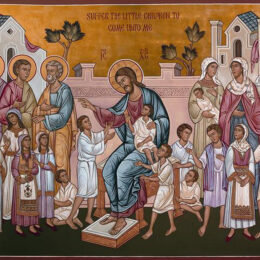Some of you may have noticed my postings on the main page have been intermittent, I disappear for several days and then reappear, etc. It’s because I’ve been tied up with a lot of extra work closing out my ministry in Atlanta in order to start a new work at another parish.
On July 1, I start serving St. Katherine’s Greek Orthodox Church in Naples, Florida. I am going there next Monday to find a place to live, returning late in the week to serve my final liturgy in my present parish, and then moving my belongings on the Monday following. I will pop in and out as time permits. (All told I will spend 30 hours in the car in a 7 day period. Not as grueling as last summer though, when I travelled 1300 miles in one day. My car broke down in northeast Georgia. I lived in southern Florida. I got a rental while the car was being fixed and when it was ready for pick up I drove the 625 miles up and the 625 miles back in one day. I left at five in the morning and got home at 11:30 that evening. This was 100 miles farther than the distance from Minneapolis to New York City.)
My wife, daughter, andáI like sun and water. Heat is better than cold we say, and growing up in Minnesota we know the difference. I served the Fort Myers parish for four years so we know the area well and look forward to returning to it. Palm trees are cool too.




God Speed you in your new ministry!
May God bless you and your family and grant you the greatest of success in your new assignment!
Best practices for a successful church:
1. Every person who walks through the Church door is made to feel wanted and welcome.
2. Use of the church as a setting for bickering and social rivalry is strongly discouraged.
3. Friendship and fellowship among parishioners is developed through church activities and volunteer work.
4. There is openness and transparency regarding church financial and administrative business.
5. The Priest provides sermons rich in spiritual content that help parishioners better understand Christ’s teachings and their applicability to their own personal lives.
6. Parishioners are encouraged and assisted to advance their own spiritual development through prayer, participation in the sacraments and bible study.
7. Parishioners are encouraged to think of the church as a place of healing and renewal during times of spiritual crisis.
Add any others you think make a church successful
I’m not sure whether Mr. Scourtes knows or not that Fr. Jacobse is the most successful rebuilder of troubled parishes in the Greek Archdiocese today. He has accomplished this not through applying a list of “best practices,” but by preaching faithfully and accurately the gospel of Christ. He has thereby strengthened the faith of those who want to hear the gospel while limiting and exposing the antagonistic malice of those who want to control church communities for their own selfish ends. A Christian parish is where sinners come to hear of the justice and mercy of God, to learn to love their neighbors, and to be gathered into the Body of Christ, not a center for individualistic self-betterment.
Congrats Father! Many Years in your new parish!
Bill: I wasn’t trying to critique Father Jacobse, just trying to initiate a discussion on what makes a parish successful. From his comments in the blog its clear that he is a thoughtful, intellegent and concientious Priest and his new parishioners are lucky to get him.
My own Priest is a Republican like Father Jacobse, and although I disagreed with his support for the war in Iraq, he has provided me with many spiritual insights which are a thousand times more important than our political differences.
Dean,
Christopher Fry wrote in his play, “The Lady’s Not for Burning”: “What is deep, I will have deeply, what is good, I will have well.” Your list, as practical as it may be, is shallow and does not do justice to the One, Holy, Catholic, and Apostolic Church that every parish embodies through the grace and mercy of our Lord, God and Savior, Jesus Christ. Therefore, I would vote “none of the above” on your list.
What makes a sucessful parish is faithful adherence to the sacraments, a profound sense of awe each and every time we enter one of our Holy Temples, a laity that is dedicated to prayer, fasting, and almsgiving, a priest who is priest, not a social worker,i.e., one who offers sacrifice for his people and is a faithful witness in word and deed to the teachings of the Church. A great example of how my priest fulfills his role: He preached a sermon one Sunday that had as a main theme a spiritual problem that I was intensly struggling with. Although he made no possible reference to me in the sermon, as soon as liturgy was over, he came to me and apologized and hoped I was not offended, assuring me that he was not thinking of me or attempting to use me as an example–he was talking about himself. That is the deep humility and sensitivity which is necessary not just for the priest, but for all of us. Some of your list can certainly reflect such a state, but one cannot begin at the level which you suggest and hope for success. You are approaching the question backwards, logically and practically.
Our Holy Temples are not Mr. Roger’s Neighborhood and the priest is not Barney.
Dean and Michael,
One of my relatives works for a church institution; I asked him once what he felt made a good priest. He mentioned several characteristics: a good liturgical style, an ability to teach an “Orthodox” vision, good counseling skills, and the like. But in ten minutes of talking, he did not once mention the good news of Christ. And it is not enough to say, “Oh, yes, of course that is important too.” The gospel is far more than “important.” It is the sine qua non of the Church’s existence. The traditions of the Church, its doctrine, liturgy, prayer, and communal existence, all are constituted by the Word of God which gives life. Without the gospel, the Church is nothing more than a bizarre sort of Masonic lodge or similar geselleschaft.
And because the gospel itself is predicated by “Jesus Christ and him crucified,” division must necessarily occur between those who hear it and believe it and do it, and those who wish to use the church to satisfy their own selfish desires for power or conflict or scandal. The Church, no less than the world, is a battleground between those who love God and seek His righteousness and those who hate God and oppose those who love him (paradoxical as this may at first appear). First, therefore, MUST come acknowlegement of one’s own sinfulness and humbling of oneself before God, abandoning self-interest in favor of God’s will being done. And even after the message of God’s saving love in Christ has been received into the heart, there is still the discipline outlined by St. Paul in Romans 7:17-24, that the believer remain humbly conscious that God can still withdraw his grace and raise up a new believer instead. Those things like good will, patience, peaceable behavior, mutual love, and the like within the community are the expected responses to hearing and believing the gospel, not preconditions for hearing it, lest we think that we have acquired the gospel by our own efforts and not God’s. Only God through His Word can make a parish “successful.” Despite every good intention, we cannot.
Therefore, with Michael, I would place Dean’s list of “best practices” at the end of the process, not at the beginning. And Dean, it looks like you got your wish for a discussion of what makes a parish “successful”: a worthy topic indeed, and thanks for introducing it.
Well, back to Florida. Long time no see, so to speak. Send me a phone number and I’ll give you a call. — jim h
Many years, Father! I hope your voice will not be missing from blogoslavia for too long!